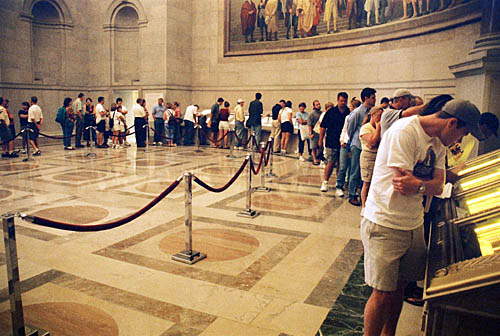JANUARY 21, 2021 – Recently, a college friend with academic credentials deeper than the seven layers of Troy uncovered a volunteer opportunity with the National Archives Citizen Archivist Project. The task involves transcribing old documents. As a PhD anthropological archeologist, he’s eminently qualified. In his email about it he wrote, “Transcribing some of these records would be a wonderful retirement project for me. It beats ‘Welcome to Wal-Mart’ and ‘Do you want paper or plastic for your groceries?’” I chuckled. The friend and former Polar Bear (our college mascot) hockey goalie isn’t only a gentleman and a scholar. He’s a gifted writer, and given his archeology background, he’s definitely down to earth.
I used to associate “National Archives” with the Declaration of Independence and the Constitution. I remember distinctly gawking at those sacred documents displayed under security glass in casements housed inside the National Archives building in Washington. Most memorable was how the enshrinement reflected respect for principles. Paying homage to those principles, we tourists waited patiently in queue to etch our memories with a glimpse of the ink-on-parchment icons of our democracy.
As I shuffled along the marble floor, I recalled the seemingly infinite line of “pilgrims” I’d observed years earlier leading to the mausoleum outside the Kremlin wall. I’d had no interest in joining the hapless crowd to view the embalmed corpse of a tyrant—still on display over a half century after his death in a cynical effort by his successor tyrants to keep the masses in line. Nowhere in sight were the values of an aspirational society.
That visit to the National Archives was decades ago. Today, most of us associate “National Archives” with classified documents improperly handled by a former president . . . and a former vice-president, now current president. The long shadow of election denialism and January 6, meanwhile, still threaten our nation’s foundational principles, as enshrined in the Bill of Rights and the Declaration of Independence.
While the National Archives recruits volunteers to transcribe fragile, documentary fragments of our expansive historical record, I worry about the future; about a political culture infused with impatience, ignorance, myopia, personality cultism, extremism and anti-intellectualism. I worry that future generations visiting the National Archives will be viewing embalmed ink-on-parchment without understanding bygone principles strangled by a failed political culture.
If we value the house we’ve erected upon our foundations—however flawed the house and the foundations—we need to eschew complacency and discouragement. We need to confront contempt for our principles and breathe new life into them. Inter alia, this means isolating the extremists in Congress who lust for power grounded in outlandish celebrity, and holding to account a party so bereft of moral, ethical and intellectual courage, it can’t condemn universally and unequivocally, a pathological liar in its thin House majority—a rotten apple, who, in a shameless game of self-aggrandizement, will play his liar’s poker hand as it suits the Speaker who depends on the liar’s votes.
The task isn’t easy. It requires breaking the destructive symbiosis between rightwing media outlets/platforms and their followers, whose numbers drive advertising revenues. The relationship depends on feeding—and fanning—insatiable appetites for red political meat heavily salted with falsehoods and distortions and strongly peppered with (false) exclusionary religious doctrine.
As candidates start positioning for 2024, may we re-discover our archived principles.
(Remember to subscribe to this blog and receive notifications of new posts by email.)
© 2023 by Eric Nilsson

2 Comments
Thank you for putting elegance into a grubby, evil situation. This blog will stay in my file to reread and share.
My grandfather, Ulysses Grant Taylor, was the construction manager for the National Archives building more than 75 years ago. He saw the Declaration of Independence’s positioning behind protective glass.
Comments are closed.